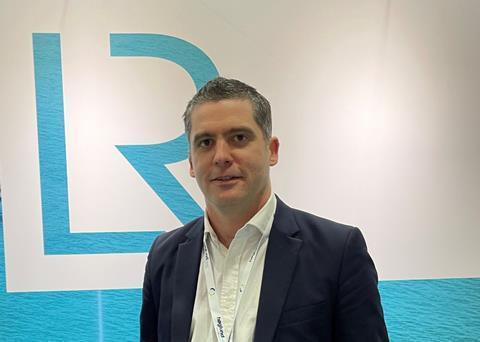Mark Darley, Director, Marine & Offshore at Lloyd’s Register offered his perspectives on the rapidly changing commercial maritime market in an exclusive interview with The Motorship at Nor-Shipping in Lillestrom
Precise and pithy, Mark Darley offers a crisp overview of the many different areas of work in which Lloyd’s Register (LR) is engaged, in an interview covering alternative fuels, decarbonisation, digitalisation and even the regulatory environment.
“Mark Darley, Director Marine & Offshore, Lloyd’s Register” “/ / 
Source: The Motorship
Mark Darley, Director Marine & Offshore, Lloyd’s Register
Darley brightens at the end when we discuss the challenge of leading a large organisation during a period of unprecedented technological and regulatory change, describing it as “stimulating” with a grin.
Early in the interview, Darley struck a more sombre note when he discussed the international regulatory environment.He was struck by the similarities between the current international situation and a ‘Competing Nations’ scenario from a 2013 LR, QinetiQ and University of Strathclyde research report, Global Marine Trends 2030. There were risks of regional regulatory divergence, as different countries pursued their own economic agendas, while from a UK standpoint, there were unresolved questions about how the UK would align itself with the EU’s Fit for 55 and maritime ETS plans.
This situation had been exacerbated by recent events in Eastern Europe. “We can see what is happening now in the world geopolitically,” Darley said simply.
While Darley expressed sympathy with regional regulators who want to accelerate the process of maritime decarbonisation, he also noted that the emergence of divergent regional schemes was likely to introduce a huge amount of complexity and inefficiency into the industry. How will a tramp vessel operator manage his exposure to different emissions trading schemes in Europe or the UK without setting up teams of people to handle their exposure, he asked.
“We would like the IMO to remain the central platform that can bring people together around a Carbon Levy and carbon trading scheme.” Darley also noted that an IMO-funded R&D fund would help fund the applied research required to bring new technological solutions to market by 2030. “This money could also help the wider industry: most of our clients are owner operators of five ships or fewer, and do not have their own research and development capability.”
Decarbonisation
Turning to decarbonisation, Darley noted that there were two candidate technologies that have received less attention that other alternatives in recent months.
Hydrogen has been boosted following the growing number of countries that have released their own national hydrogen strategies since the middle of 2019, such as the UK and India in 2021. While these hydrogen strategies are primarily focused on supply and demand issues, rather than the maritime angle, they are driving conversations about the scale of maritime’s future hydrogen requirements and questions around the transportation of green hydrogen.
While LR is fuel agnostic, it is playing a full part in the introduction of hydrogen. “We’ve already got hydrogen fuel ships in the water,” Darley said, and have been involved in larger hydrogen projects, such as the With ORCA project that the class society announced just before Nor-Shipping.
Darley also notes that customers are beginning to show an increasing interest in civilian nuclear-fuelled propulsion, with the advent of newer technologies such as molten salt technologies. Consumer attitudes rather than technological issues remain the main constraint, although there are signs that scepticism may have softened since the beginning of the year.
Returning to alternative fuels, Darley notes that non-disclosure agreements limit detailed discussions of the “two dozen” alternative fuel projects in which LR is involved. However, Lloyd’s Register’s Decarbonisation Hub has had significant success in bringing together stakeholders from different segments, and positions in the supply chain since it opened in December 2020. “This experience has helped us develop our own capabilities, as we have brought together engineers and experts from inside and outside the maritime sector.”
Digitalisation
Darley noted that one of the legacies of the Covid-19 pandemic has been an acceleration of data connectivity and data transfer on vessels, more use of sensors, as well as an increased interest in digitalisation services by customers.
Digitalisation tools offer advantages for shipowners who want to better understand the operation of their assets – and data analysis services are one of the fastest growing parts of LR’s business. In fact, LR plans to introduce a digital twin-based solution for customers before the end of 2022 (as reported in The Motorship here).
However, Darley is equally keen to discuss how technological developments are offering advances in ship safety. Recent advances in the economics of wireless battery-less sensor technology means that it is possible to use the motion of the vessel to power fire and smoke detectors. One potential application would be in the improving early smoke detection deep in the stacks of ultra large container vessels.





